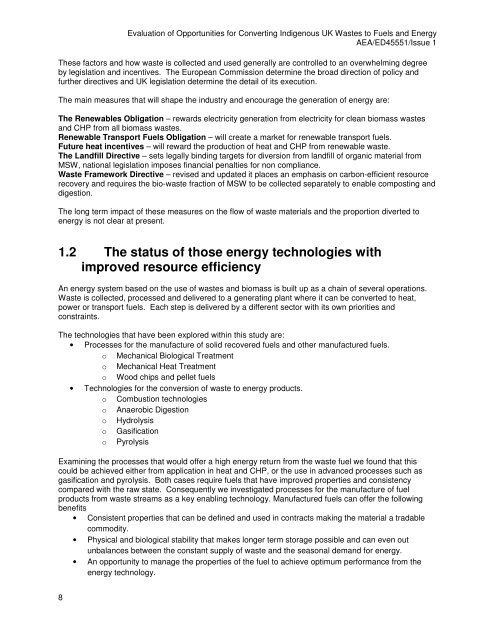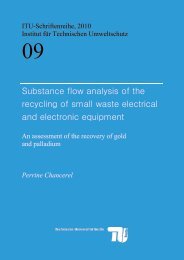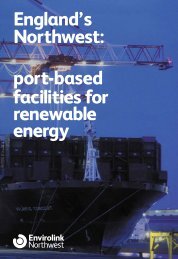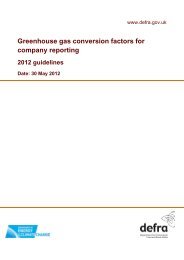to read the full report - Ecolateral by Peter Jones
to read the full report - Ecolateral by Peter Jones
to read the full report - Ecolateral by Peter Jones
You also want an ePaper? Increase the reach of your titles
YUMPU automatically turns print PDFs into web optimized ePapers that Google loves.
8<br />
Evaluation of Opportunities for Converting Indigenous UK Wastes <strong>to</strong> Fuels and Energy<br />
AEA/ED45551/Issue 1<br />
These fac<strong>to</strong>rs and how waste is collected and used generally are controlled <strong>to</strong> an overwhelming degree<br />
<strong>by</strong> legislation and incentives. The European Commission determine <strong>the</strong> broad direction of policy and<br />
fur<strong>the</strong>r directives and UK legislation determine <strong>the</strong> detail of its execution.<br />
The main measures that will shape <strong>the</strong> industry and encourage <strong>the</strong> generation of energy are:<br />
The Renewables Obligation – rewards electricity generation from electricity for clean biomass wastes<br />
and CHP from all biomass wastes.<br />
Renewable Transport Fuels Obligation – will create a market for renewable transport fuels.<br />
Future heat incentives – will reward <strong>the</strong> production of heat and CHP from renewable waste.<br />
The Landfill Directive – sets legally binding targets for diversion from landfill of organic material from<br />
MSW, national legislation imposes financial penalties for non compliance.<br />
Waste Framework Directive – revised and updated it places an emphasis on carbon-efficient resource<br />
recovery and requires <strong>the</strong> bio-waste fraction of MSW <strong>to</strong> be collected separately <strong>to</strong> enable composting and<br />
digestion.<br />
The long term impact of <strong>the</strong>se measures on <strong>the</strong> flow of waste materials and <strong>the</strong> proportion diverted <strong>to</strong><br />
energy is not clear at present.<br />
1.2 The status of those energy technologies with<br />
improved resource efficiency<br />
An energy system based on <strong>the</strong> use of wastes and biomass is built up as a chain of several operations.<br />
Waste is collected, processed and delivered <strong>to</strong> a generating plant where it can be converted <strong>to</strong> heat,<br />
power or transport fuels. Each step is delivered <strong>by</strong> a different sec<strong>to</strong>r with its own priorities and<br />
constraints.<br />
The technologies that have been explored within this study are:<br />
• Processes for <strong>the</strong> manufacture of solid recovered fuels and o<strong>the</strong>r manufactured fuels.<br />
o Mechanical Biological Treatment<br />
o Mechanical Heat Treatment<br />
o Wood chips and pellet fuels<br />
• Technologies for <strong>the</strong> conversion of waste <strong>to</strong> energy products.<br />
o Combustion technologies<br />
o Anaerobic Digestion<br />
o Hydrolysis<br />
o Gasification<br />
o Pyrolysis<br />
Examining <strong>the</strong> processes that would offer a high energy return from <strong>the</strong> waste fuel we found that this<br />
could be achieved ei<strong>the</strong>r from application in heat and CHP, or <strong>the</strong> use in advanced processes such as<br />
gasification and pyrolysis. Both cases require fuels that have improved properties and consistency<br />
compared with <strong>the</strong> raw state. Consequently we investigated processes for <strong>the</strong> manufacture of fuel<br />
products from waste streams as a key enabling technology. Manufactured fuels can offer <strong>the</strong> following<br />
benefits<br />
• Consistent properties that can be defined and used in contracts making <strong>the</strong> material a tradable<br />
commodity.<br />
• Physical and biological stability that makes longer term s<strong>to</strong>rage possible and can even out<br />
unbalances between <strong>the</strong> constant supply of waste and <strong>the</strong> seasonal demand for energy.<br />
• An opportunity <strong>to</strong> manage <strong>the</strong> properties of <strong>the</strong> fuel <strong>to</strong> achieve optimum performance from <strong>the</strong><br />
energy technology.








